by California Casualty | Educators, News |
Despite losing homes and setting up classes in a temporary building 25 miles away in Chico, Paradise Intermediate School (PINT) staff are back at work helping students. The vacant Orchard Supply Hardware store where the school is now housed is not the most inviting environment. Employees have done the best that they can under the circumstances. PINT School Lounge Makeover
California Casualty is gifting the School Lounge Makeover to offer a more soothing, useful area for instructors and support personnel to take a break, relax and recharge. PINT School Lounge Makeover
Principal Cris Dunlap, who is one of 35 PINT staff members who lost a home in the fire, said this offer means so much. “We’ve focused so much on giving students a learning space and place to be with their teachers and friends. As educators, we put others ahead of ourselves. It’s so nice that California Casualty recognizes the valor of our teachers and everything they are doing to keep the district going and keeping kids happy and learning.”
“We’ve seen the dedication of administrators, teachers and staff firsthand and we’re proud to show our appreciation,” said California Casualty Sr. Vice President, Mike McCormick.
Eon Office designers will be work with PINT staff to create the school lounge of their dreams. The finished project will be revealed later this spring. The lounge will be relocated back at Paradise Intermediate School once repairs there are completed.
Learn more about California Casualty’s School Lounge Makeover at www.schoolloungemakeover.com.
by California Casualty | News |
Congratulations to the five 2019 California Teachers of the Year who were recently honored during the annual gala for their exceptional impact on students, schools and their communities.
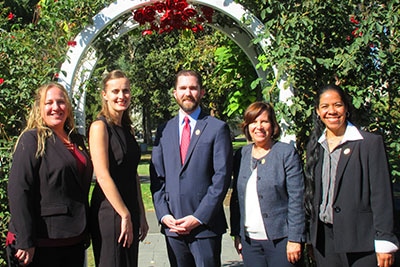
2019 California Teachers of the Year
The 2019 Teachers of the Year, who represent thousands of dedicated educators across the state, are:
- Rosie Reid, Mount Diablo Unified School District
- Eric Boomer, Upper Lake Unified School District
- Kim Holtz, Manhattan Beach Unified School District
- Michael Henges, Redondo Beach Unified School District
- Angel Mejico, Corona-Norco Unified School District
Ms. Reid will also represent California in the National Teacher of the Year competition.
“These teachers are a critical piece of maintaining California’s leadership in education and we thank them for being an inspiration to us all,” said California Casualty CEO Beau Brown after attending the annual ceremony.
“This year’s California Teachers of the Year ceremony was a celebration of the wonders of education and the amazing instructors who have dedicated their lives to our children,” said AVP Lisa Almeida. “We at California Casualty are so proud to support these awardees and all of the amazing educators across the state of California.”
As the Presenting Sponsor, California Casualty’s continued support is helping to make possible these other California School Recognition Programs:
- California Distinguished Schools – honoring exemplary public schools which demonstrate significant gains in narrowing the achievement gap
- California Exemplary Districts – celebrating the achievements of districts that have implemented model practices with positive impact on student outcomes
- California Green Ribbon Schools – recognizing schools and districts for excellence in whole-school environmental sustainability
- Classified School Employee of the Year – highlighting those who symbolize the profession’s commitment to education
California Casualty is proud to join the California Department of Education, the California Teachers of the Year Foundation and California Teachers Association in honoring educators who make a difference for their students and communities. California Casualty field representatives will present awards and attend other special recognition ceremonies, enhancing the company’s 67-year commitment to educators.
by California Casualty | News |
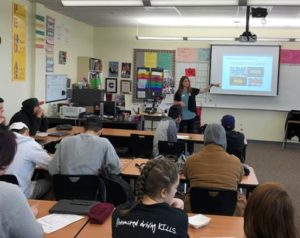 California Casualty Customer Care Specialist Darrah Z. recently received an unusual request from Union High School (Evergreen School District – Washington) Math Teacher and long-term customer Jeanie Langley. “Jeanie sent me an email asking about an expert who could teach insurance fundamentals to her students,” said Darrah. Darrah sent Jeanie’s request to the Partner Relations Team for a follow-up to find out what California Casualty could do to help. It turns out that Jeanie wanted to mix it up a bit in her Financial Literacy senior class. “My students were losing interest, and I needed to do something to bring them back around,” Jeanie told us. “They are about to be real-life adults, so this is serious! I wanted to invite specialists in as guest speakers.” On different days, Jeanie had representatives from a car dealership, a local credit union, an apartment landlord organization, colleges, and health and life insurance agents come in to speak to her seniors. Ultimately, Darrah connected Jeanie with Erica Reich, a California Casualty Field Marketing Manager in Washington. Erica immediately jumped on board and agreed to take the lead role in Jeanie’s “Auto Insurance” module within Union High School’s Financial Literacy class.
California Casualty Customer Care Specialist Darrah Z. recently received an unusual request from Union High School (Evergreen School District – Washington) Math Teacher and long-term customer Jeanie Langley. “Jeanie sent me an email asking about an expert who could teach insurance fundamentals to her students,” said Darrah. Darrah sent Jeanie’s request to the Partner Relations Team for a follow-up to find out what California Casualty could do to help. It turns out that Jeanie wanted to mix it up a bit in her Financial Literacy senior class. “My students were losing interest, and I needed to do something to bring them back around,” Jeanie told us. “They are about to be real-life adults, so this is serious! I wanted to invite specialists in as guest speakers.” On different days, Jeanie had representatives from a car dealership, a local credit union, an apartment landlord organization, colleges, and health and life insurance agents come in to speak to her seniors. Ultimately, Darrah connected Jeanie with Erica Reich, a California Casualty Field Marketing Manager in Washington. Erica immediately jumped on board and agreed to take the lead role in Jeanie’s “Auto Insurance” module within Union High School’s Financial Literacy class.
Erica arrived at Union HS bright and early with a flash drive, and clicker in hand prepared to talk through a 45-minute presentation she developed with her Team Manager Brian Goodman. “Jeanie told me beforehand that this group of students can be inattentive,” Erica added. “So that’s why I brought a few ‘Distracted Driving Kills’ Impact Teen Driver t-shirts with me as prizes… I was tossing them out to the kids right away if they engaged with me.” It didn’t take long before the students were learning the difference between liability insurance, collision and comprehensive coverage, transportation, uninsured motorist, PIP, and towing options. “We taught them how to read a Declarations Page! It was a lot of fun and felt like the right thing to do,” Erica said.
“It didn’t take long for the word to get out,” said TM Brian. “She did such a great job connecting with the students.” A few days after her presentation, Erica received an email from fellow Evergreen SD teacher Allison Wallace. Allison teaches Personal Finance at neighboring He La High School. She heard about the class Erica taught for her friend Jeanie. Allison asked Erica if she would be willing to bring her expertise to her classroom, as well. Allison said, “My students have to learn to budget living expenses, investments, insurance, and credit cards. So now, Erica will be teaching two separate Personal Finance auto insurance modules. Brian added, “Word spreads quickly! Erica is volunteering her time to help kids which is worth it right there. And she is showing Evergreen High School educators the spirit of what California Casualty is all about. It’s more than providing auto and home insurance coverage – it’s our dedication to supporting and building long-lasting relationships with NEA members at all levels that truly sets California Casualty apart.”
As Erica was leaving the class at the end of the first presentation, customer Jeanie Langley told her, “I’m going home to look at my California Casualty Dec Page!”
by California Casualty | Calcas Connection, In Your Community, News |
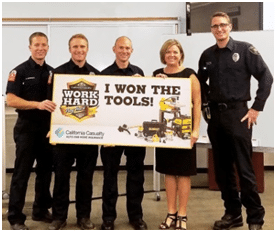 We realize how dedicated you are to making your communities better places. That’s why California Casualty created giving initiatives to say thanks to the members of the affinity groups with whom we work.
We realize how dedicated you are to making your communities better places. That’s why California Casualty created giving initiatives to say thanks to the members of the affinity groups with whom we work.
Recently, Tucson fire captain Max S. was the recipient of a $5,000 Work Hard/ Play Hard “Choose Your Tools” award from California Casualty. The contest recognized the dangerous work first responders do. Max loved the prize because it’s a gift that will last him a lifetime. “I appreciate California Casualty for understanding how hard firefighters work,” he said.
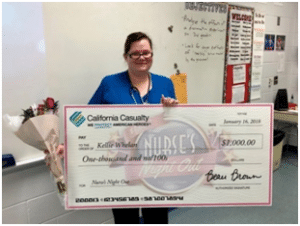 And New Jersey RN Kellie W., a policyholder herself, started the New Year with a $1,000 Nurses Night Out award from California Casualty. Kellie, a school nurse and a member of the New Jersey Education Association, said, “I was so surprised and honored to receive this prize from California Casualty.”
And New Jersey RN Kellie W., a policyholder herself, started the New Year with a $1,000 Nurses Night Out award from California Casualty. Kellie, a school nurse and a member of the New Jersey Education Association, said, “I was so surprised and honored to receive this prize from California Casualty.”
The Nurses Night Out award was created to thank nurses and nurse practitioners for all they do to keep their communities healthy. The winners can use the $1,000 in any way they wish: hosting a party, a relaxing day at the spa, or taking a much-needed vacation.
Nurse Kellie plans on using the funds for a summer tour of the national parks with her family, but will also treat teachers and staff at the school to a breakfast in the near future.
“California Casualty protects American heroes and we want to show our support to the men and women who take care of America,” emphasized Mike McCormick, California Casualty Sr. Vice President.
TAKEAWAY:
Learn more about the many ways California Casualty gives back to the individuals and groups that we serve by visiting www.calcas.com/newsroom.
Read all the articles from this edition of the Calcas Connection Newsletter:
by California Casualty | News |
There is much debate about what millennials think and do. Many experts have predicted that they won’t stay with a company very long, and with their swift acceptance of the sharing economy, millennials are the generation that won’t buy homes or cars. That appears to be far from reality. In fact, it appears they are tremendously misunderstood.
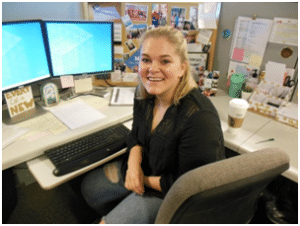 “That doesn’t match my life at all,” said Sarah W. I’m in the process of buying a home and I see myself staying at this place for the duration. Sarah is in her second year as a customer service advisor with California Casualty.
“That doesn’t match my life at all,” said Sarah W. I’m in the process of buying a home and I see myself staying at this place for the duration. Sarah is in her second year as a customer service advisor with California Casualty.
Elizabeth C. shares Sarah’s enthusiasm. She and her husband have just bought their first home. She is flourishing as a sales consultant. “I just graduated college in December and California Casualty was one of my first picks,” she said. “It really helps knowing the average person here has been with the company 12 years and many have 20 to 30 years of experience. Most other companies have high turnovers and people aren’t happy. Here, people are happy and they enjoy their job.”
Elizabeth thinks she will be with the company for many 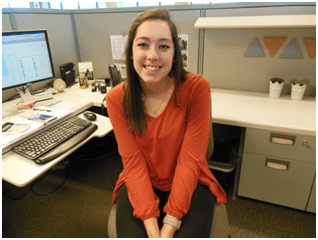 years.
years.
Sarah concurs, adding that she anticipates staying with California Casualty for decades. She loves working with quality people and doesn’t want to be “one of those who say I worked a year here and a year there.” She added, “People are happy working here and that’s why they stayed.”
California Casualty, provider of auto and home insurance to educators, law enforcement professionals, firefighters and nurses, is also looking to prove the so-called “experts” wrong about the millennial generation. The company is now hiring in Leawood, Kansas; Colorado Springs, Colorado; and Phoenix, Arizona, looking for young, motivated people who yearn for a well-paying career with longevity and stability.
Longevity is the Norm
California Casualty is entering its 104th year as a family owned company. It is guided by the California Casualty Code, written more than 50 years ago, which spells out how clients should be treated. The Code has helped cement long-standing business relationships with the members of the affinity groups that California Casualty does business with.
“I love working for the company because I get to help first responders and American heroes protect their most valuable assets,” stressed Robert H. He can’t imagine working anywhere else, adding, “They treat employees right, and I plan on being one of the long-time veterans.”
Robert and others say it’s impressive how California Casualty values its employees, many who have 25 years or more years with the company.
Deana P. is in her 40th year with the company. What’s the secret to her longevity? “The great culture and so many people living up to the California Casualty Code,” she said. “That and how everyone chips in to help others when there is a coworker in need.”
Steve A., a veteran of more than 30 years, says the family atmosphere is the key. “I like the size of the organization because it allows for individual recognition and there is a sense that individual contributions truly do make a difference. As a privately held company the atmosphere seems less corporate and more personal, and the company is currently headed by a descendent of the founder of the company, who formed the company over 100 years ago. When Beau Brown, our CEO, visits with me, the conversation often involves our families and personal interests. The leadership is supportive, encouraging and professional with ethics being of utmost importance.”
Beau Brown is the fourth generation CEO from the Brown family. He makes it a point to meet and greet as many of the employees as possible. He can often be seen saying hello and catching up with each person, checking to see how their job is going. Providing a quality work/life balance is extremely important to the company, which also allows for casual dress and promotes employee social activities for team members at its service centers, located in Colorado, Kansas and Arizona. Employees are recognized every five years for work anniversaries, and Beau and other Operating Committee executives host and serve an annual lunch at each of the three service centers located in Colorado Springs; Glendale, Arizona; and Leawood, Kansas. Beau feels it’s important that every member of the California Casualty family is thanked and shown appreciation for the hard work they do. The employee-focused approach is resonating with younger workers.
Tiffany L. remarked, “I can’t wait to say that I have worked with this company for so many years. I feel proud to work for a company that lives with integrity and doesn’t just talk about it.” Tiffany, into her second year with the company, owns her own home and cringes at those throwing money away on rent each month.
California Casualty wants to share its promise of stable, rewarding employment with people who value helping those who serve our communities.
And, for members of the younger generation who want to buy a home and drive a vehicle they own, California Casualty is ready to offer a career that can span decades. Are you ready for a rewarding career with California Casualty? Check out opportunities and apply at https://www.calcas.com/careers.
by California Casualty | News |
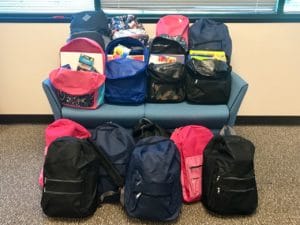
California Casualty not only has a family friendly atmosphere but also gives back to local communities. Year-round our employees participate in multiple philanthropic events across the company. We recognize those who serve our communities and support our home towns in many ways.
Recently, our Kansas office engaged with a local charity that focuses on giving supplies to local foster children who may not have back-to-school essentials. Our employees were able to fill 15 backpacks full of school supplies that included notebooks, folders, pencils, pens, highlighters and more through donations.
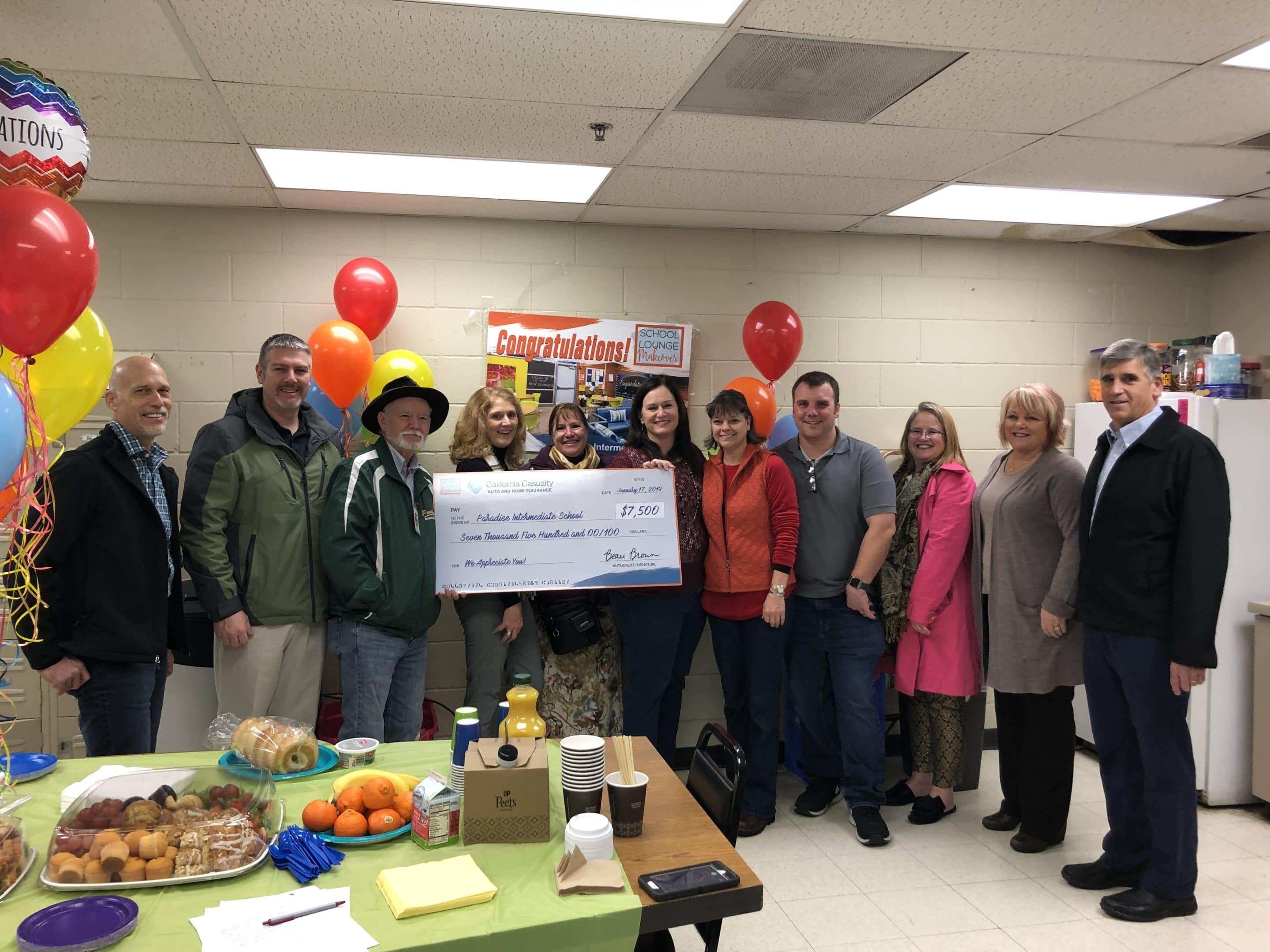
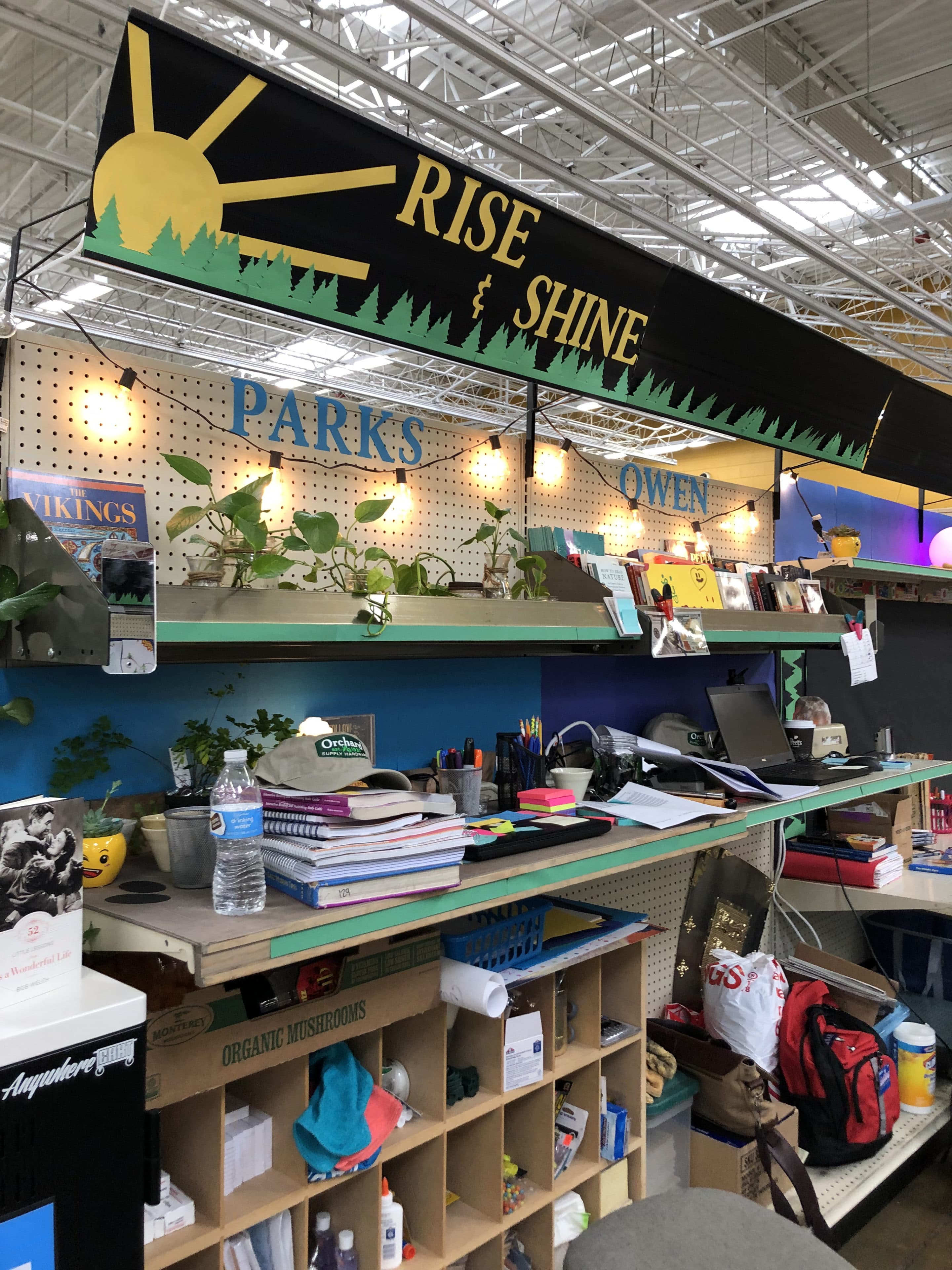


 California Casualty Customer Care Specialist Darrah Z. recently received an unusual request from Union High School (Evergreen School District – Washington) Math Teacher and long-term customer Jeanie Langley. “Jeanie sent me an email asking about an expert who could teach insurance fundamentals to her students,” said Darrah. Darrah sent Jeanie’s request to the Partner Relations Team for a follow-up to find out what California Casualty could do to help. It turns out that Jeanie wanted to mix it up a bit in her Financial Literacy senior class. “My students were losing interest, and I needed to do something to bring them back around,” Jeanie told us. “They are about to be real-life adults, so this is serious! I wanted to invite specialists in as guest speakers.” On different days, Jeanie had representatives from a car dealership, a local credit union, an apartment landlord organization, colleges, and health and life insurance agents come in to speak to her seniors. Ultimately, Darrah connected Jeanie with Erica Reich, a California Casualty Field Marketing Manager in Washington. Erica immediately jumped on board and agreed to take the lead role in Jeanie’s “Auto Insurance” module within Union High School’s Financial Literacy class.
California Casualty Customer Care Specialist Darrah Z. recently received an unusual request from Union High School (Evergreen School District – Washington) Math Teacher and long-term customer Jeanie Langley. “Jeanie sent me an email asking about an expert who could teach insurance fundamentals to her students,” said Darrah. Darrah sent Jeanie’s request to the Partner Relations Team for a follow-up to find out what California Casualty could do to help. It turns out that Jeanie wanted to mix it up a bit in her Financial Literacy senior class. “My students were losing interest, and I needed to do something to bring them back around,” Jeanie told us. “They are about to be real-life adults, so this is serious! I wanted to invite specialists in as guest speakers.” On different days, Jeanie had representatives from a car dealership, a local credit union, an apartment landlord organization, colleges, and health and life insurance agents come in to speak to her seniors. Ultimately, Darrah connected Jeanie with Erica Reich, a California Casualty Field Marketing Manager in Washington. Erica immediately jumped on board and agreed to take the lead role in Jeanie’s “Auto Insurance” module within Union High School’s Financial Literacy class. We realize how dedicated you are to making your communities better places. That’s why California Casualty created giving initiatives to say thanks to the members of the affinity groups with whom we work.
We realize how dedicated you are to making your communities better places. That’s why California Casualty created giving initiatives to say thanks to the members of the affinity groups with whom we work. And New Jersey RN Kellie W., a policyholder herself, started the New Year with a $1,000 Nurses Night Out award from California Casualty. Kellie, a school nurse and a member of the New Jersey Education Association, said, “I was so surprised and honored to receive this prize from California Casualty.”
And New Jersey RN Kellie W., a policyholder herself, started the New Year with a $1,000 Nurses Night Out award from California Casualty. Kellie, a school nurse and a member of the New Jersey Education Association, said, “I was so surprised and honored to receive this prize from California Casualty.” “That doesn’t match my life at all,” said Sarah W. I’m in the process of buying a home and I see myself staying at this place for the duration. Sarah is in her second year as a customer service advisor with California Casualty.
“That doesn’t match my life at all,” said Sarah W. I’m in the process of buying a home and I see myself staying at this place for the duration. Sarah is in her second year as a customer service advisor with California Casualty. years.
years.